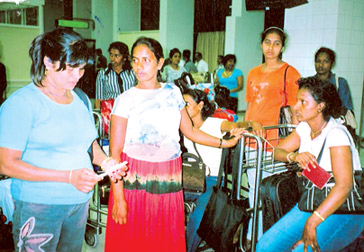The family is life!
By Indunil THENUWARA
|

The International Day of Families logo
|
A family is the most fundamental unit of society. Nuclear or
extended, this basic component is the thread that holds the fabric of a
community together, lending physical or mental support to each of its
members. It's the most essential centre of society and provides a stable
and safe sanctuary for people of all ages.
The increasing deterioration of societies all over the world that we
have been witnessing of late is a result of the break-up of this basic
unit. For society as we know it, to thrive, it's important that the
sanctity of family is maintained.
It's to pay special attention to families and acknowledge the vital
role that they play in life that the United Nations commemorates the
International Day of Families every May 15.
|
History
The decision to commemorate
May 15 as the International Day of Families was taken by the
United Nations General Assembly on September 20, 1993. The
Day has been observed since 1995.
The UN dedicated this day to
encourage governments and other organisations to initiate
family-oriented projects, hold special conferences, symposia
and cultural events on the family, bring into force family
legislation and discuss national family policies. |
The global observance celebrates the importance of the family unit to
people, society and cultures around the world and focuses on continuing
the work started during the International Year of Families in 1994. It
gives an opportunity to promote awareness of issues relating to families
and to promote action in this regard.
This year's celebrations would take place on May 13 organised by the
UN Department of Economic and Social Affairs and Department of Public
Information with support from the UN Program on the Family and Division
for Social Policy and Development.
In Sri Lanka too, the traditional family structure has come under
intense pressure over the past few decades. According to Senior
Professor of Sociology of the University of Colombo, S. T. Hettige,
there are two primary reasons for these developments.
"Firstly, the socio-economic transformation brought about as a result
of the introduction of the open economy in 1977. This increased the
mobility of the people, particularly of women, both within and outside
the island. Migration in search of greener pastures increased by leaps
and bounds. The migration of women for employment, especially to the
Middle East, has brought in its wake a heap of social problems with
children from such families being severely affected.
|

Women migrating for employment has a major impact on the family |
"Secondly, the conflict which raged in the country for over three
decades had a direct and indirect impact on the people from not just the
theatres of war in the North and the East, but throughout the country.
Soldiers from all areas of the island lost their lives and limbs in the
war while thousands were killed or maimed in bomb explosions and other
terrorist attacks elsewhere in the country. Naturally, such tragedies
placed immense pressure on families," he said.
He cited natural disasters such as the 2004 tsunami as other major
events affecting the family in Sri Lanka. "Disasters have robbed the
lives of thousands of people over the years, leading to many broken and
disorganised families."
Special significance
Prof. Hettige's words seem to have special significance with this
year's International Day for Families being conducted on the theme 'The
impact of migration on families around the world'. Vast populations
migrating due to economic, social and demographic disparities among
countries and even between different regions in the same country has
increased over the years. Some have also been driven out by climate and
environmental conditions. International migration has doubled since the
1960s, reaching 214 million while internal migration has crossed the 740
million mark. Besides the migrants themselves, this phenomenon has
affected other members of their families and communities.
|

The family that eats together stays together. |
The adverse effects of migration have been more pronounced in the
case of the migration of women especially mothers. Globally, female
migrants have remained constant at 49 percent since the 1990s although
more women may migrate independently or leave as the primary migrant. In
such families, those left behind, especially children, may face
loneliness, psychological problems such as depression and even physical
and sexual abuse in the hands of their guardians. The break-up of
families is not unheard of in such instances.
During periods of economic or political strife, migrants are more
vulnerable than the native communities. They are low paid, in high-risk
employment involving hard work and are abused and discriminated.
Refugees and Internally Displaced People are even more at risk with the
separation of such families, hardship and neglect being quite common
among such communities.
Despite the possible negative consequences of migration, it has a
plus side too, mainly in relation to the economic well-being of the
concerned families. With remittances from abroad, these families can
improve in terms of economy, health, education and basic livelihood and
lifestyle and also in gender empowerment. Providing a boost to the local
and national economy is another factor.
The authorities should introduce mechanisms where the interests of
such migrants and their dependents are safeguarded. Children especially
should be supported on their physical and emotional needs through
special counselling, school activities and house visits. The host
countries should also be open to migrants' safety and welfare. These are
some of the issues that could be highlighted on this Day.
According to Prof. Hettige, issues related to the family in Sri Lanka
should be dealt within a systematic manner. The State should take the
lead in this regard with a proper policy framework with the support of
all ministries, other organisations and society.
Policy framework
"An overall policy framework should be drawn up where the whole
family is considered as a target group. Vulnerable members within a
family should be given support. The family is the most important unit in
any society, but it's more so in developing countries. Special attention
should be paid to the needs of children and families which are headed by
women," he said.
He explained the need for mechanisms to be introduced to strengthen
and empower families. "It's time that families are taken seriously and
measures to strengthen the family structure introduced without merely
paying lip service to these issues. We should not confine ourselves to
the usual rhetoric which are part and parcel of such special days, but
take concrete action which can really make a difference," he said. |

